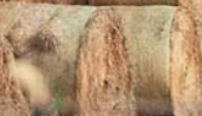By Ron Wilson, director of the Huck Boyd National Institute for Rural Development at Kansas State University.
“If life gives you lemons, then make lemonade. If life gives you coronavirus, then make hand cleanser.”
Of those two statements, you may have heard the first, but you probably have not heard the second. But that is a way of describing the strategic change that has been made by an entrepreneurial company in rural Kansas, in response to the current coronavirus pandemic.
Hayes Kelman is the founder and CEO of this company which is now producing hand cleanser for free distribution to the public. The company is Boot Hill Distillery in Dodge City.
Hayes is a fifth-generation farmer in western Kansas. According to the distillery website, he “has always looked for … new uses for the grain he grows.” Hayes was seeking innovative alternative uses for his corn, other than cattle feeding or ethanol fuel. His solution might be considered coming full circle, given Dodge City’s history as a Wild West town with saloons dispensing whiskey.
In 2014, Hayes and his father Roger Kelman opened Boot Hill Distillery to convert their corn into liquid spirits. It is described as a craft distillery. The Kelmans grow 100% of the grain which is used in their spirits. All of the product is milled, mashed, fermented, distilled and bottled on-site at Boot Hill Distillery.
The distillery is located in a building which connects to Dodge City’s history as well. It is located atop the site of the original, infamous Boot Hill cemetery where cowboys were unceremoniously buried with their boots on. In 1878, the bodies were moved to the municipal cemetery, and Dodge City’s first multi-room schoolhouse was erected at that site. It served as a schoolhouse until 1927 when it was razed to make room for a new municipal building. That building hosted various offices through the years and now is the home of Boot Hill Distillery.
As the business grew, its products earned various awards in events such as the Washington Cup Spirits Competition, Bartenders Spirit Awards, American Craft Spirits, and Heartland Spirits Fest. Instead of “farm to fork,” this was described as “soil to sip.”
Then the coronavirus pandemic hit in early 2020. Large gatherings of people were banned, and social distancing was put in place. The sudden change devastated the hospitality industry across the nation. Public consumption of all kinds of products took a hit, but the Kelmans recognized that their company’s alcohol could also serve as an element of hand cleansers.
The idea went from concept to reality in four days. Research found that the World Health Organization recommended a hand-rub formula with 80% ethanol, glycerol, hydrogen peroxide, and sterile water. The Kelmans decided to shift their production and staff time to producing hand cleanser, provided free to the public in the form of four-ounce bottles. Businesses and organizations in the region stepped up to sponsor this initiative. A GoFundMe campaign was also established to support the effort.
Certain organizations received the product in bulk. Priority was given to first responders, the medical community, nursing homes, elderly care, transportation workers, and those interacting with others who do not have access to handwashing stations.
In late March 2020, distribution sites were established where people could drive up and receive the individual hand cleanser bottles. As of this writing, the company has bottled and given out more than 60,000 bottles and 500 gallons of hand cleanser. The first distribution sites were in Dodge City. The company expressed thanks to the Ford County Sheriff’s Department and the Gunsmoke Law Dogs Law Enforcement Motorcycle Club for helping manage traffic and assisting with the distributions.
Thanks to a sponsorship by Victory Electric Cooperative, distributions were also held in rural communities served by this electric co-op. Those included rural communities such as Cimarron, Montezuma, Jetmore, Bucklin, Spearville, Copeland and Ingalls, population 306 people. Now, that’s rural.
For more information or to donate, go to www.boothilldistillery.com.
We commend Hayes and Roger Kelman for making a difference by initiating this community service, helping Kansans to stay healthy and clean.
Audio and text files of Kansas Profiles are available at http://www.kansasprofile.com. For more information about the Huck Boyd Institute, interested persons can visit http://www.huckboydinstitute.org.
———–
The mission of the Huck Boyd National Institute for Rural Development is to enhance rural development by helping rural people help themselves. The Kansas Profile radio series and columns are produced with assistance from the K-State Research and Extension Department of Communications News Media Services unit. A photo of Ron Wilson is available at http://www.ksre.ksu.edu/news/sty/RonWilson.htm. Audio and text files of Kansas Profiles are available at http://www.kansasprofile.com. For more information about the Huck Boyd Institute, interested persons can visit http://www.huckboydinstitute.org.




